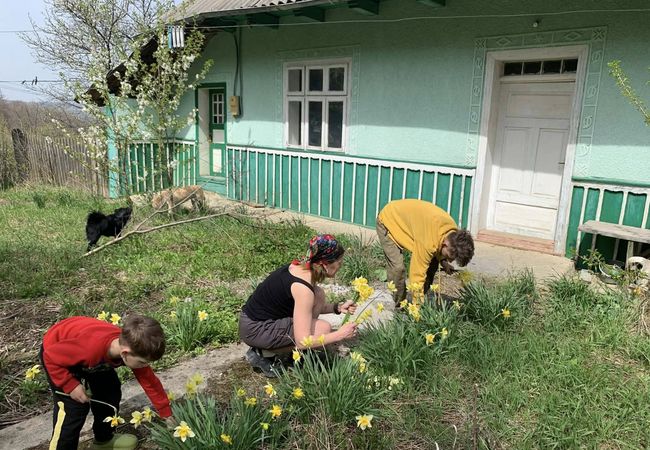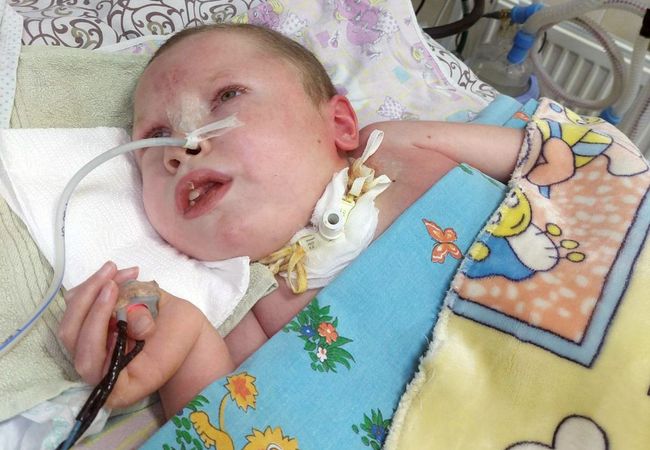More than 11 million people have fled Ukraine as a result of Russia's invasion. But many of the most vulnerable — mentally and physically disabled children — have been left behind.
The Vilshany Orphanage, located in southwestern Ukraine, is home for over 200 Ukrainian children who have physical and intellectual disabilities. Most orphans in Ukraine have parents, but have been abandoned — some have been at Vilshany for decades without a single visitor.
While it might seem heartless to leave a child behind, families often feel like they have no choice.
"Without any form of support to families to help them keep a child with a disability, it is almost impossible for families to stay together," Eric Rosenthal, founder and executive director of Disability Rights International (DRI), told TODAY Parents. "Mothers or fathers often have to give up a job to stay home with a child. That child is often denied basic health care and is not allowed to go to school. Doctors tell parents that children would be better off and that they are being selfish by keeping the child at home."
Now, more Ukrainian children with disabilities have been left behind as their parents and family members flee Russia's war in Ukraine.
"This damn war set back their development," Bohdan Kykyna, the director of Vilshany Orphanage, told NBC's Richard Engel. Vilshany leadership had to suspend modernization plans to update the facility because of the war, Kykyna added.
'A bad system that neglected kids'
The Vilshany Orphanage was originally operated under draconian conditions that left the children isolated from society. The facility did not partner with other organizations, and community members were often unable help or support the children, improve their living standards or welcome the children into society.
Then French specialists came to Vilshany and the orphanage became one of the first open institutions in Ukraine. In 2000, the facility was updated to include running hot water, and programs were put in place to better aid the children's physical and mental development.
Now, as a result of Russia's war in Ukraine, the facility is overcrowded as other orphanages have been forced to close down and evacuate. Two vital therapy rooms in Vilshany have been converted to dorms in order to house 38 additional children, Engel reports.
One child, Masha, came to Vilshany alert and malnourished. Another, with severe scoliosis, is bedridden.
"Without stretching, braces, surgery or therapy, (this child) and the others are getting worse," Engel said. "Some are malnourished. This is not a hospital — they don't do advanced treatments or much medication."
The most those caring for the children can give, Engel said, is attention, touch and affection.
"Many are clearly starving for love and their families," he added. "It's one of the hardest things you can see, because a lot of the kids here have been calling out to mom and dad ... and they aren't coming."
One child, Vlad, had been calling for his mother for several hours Engel reported. His parents fled Ukraine to Germany as refugees, along with his three healthy siblings. They left Vlad behind.
An estimated 2.5 million Ukrainian children have fled the war, according to UNICEF — many of them able-bodied children. The majority of the profoundly disabled, Engel said, have been left behind in places like Vilshany.
"A bad system that neglected kids — that left children to grow up without a family — is now massively overwhelmed," Rosenthal told Engel. "Every single day a child spends in this facility, they're losing a piece of their life."
How you can help
“We strongly recommend supporting disability and family organizations trying to protect children so they can remain (with) family in the community rather than supporting the orphanages themselves,” Rosenthal told TODAY Parents in a separate interview. “In our view, the orphanages are abusive places that should not be get more funding. There is an enormous need among families desperate to keep their kids out of orphanages. By helping those families, we will also help reduce overcrowding institutions.”
To assist on-the-ground efforts to help keep families with children who have disabilities together, people can donate to the European Network on Independent Living, a user-led network of disabled people.
People can also donate to Dzherelo Children’s Rehabilitation Centre, located in Lviv. Dzherelo is a charitable non-profit and an alternative to state-run facilities.
Donations can also be made to Disability Rights International, which documents human rights violations and works to end abusive institutional practices.
“Some people may think protecting children with disabilities is impossible during a war,” Rosenthal told TODAY. “Ukrainian disability and family activists are fighting for the right of children with disabilities to stay with families. They need our help as soon as possible.”
A 2015 report from Disability Rights International found that in times of war, "the breakdown of law and order leaves children vulnerable to neglect, exploitation and trafficking."
Unfortunately, the same report found that donating to institutions can inadvertently make things worse for the very children who need additional help and support.
"People who donate only make the situation worse," Roman, an orphanage graduate from Odessa, said in the report. "They just provide a way for directors to use state funding for their own purposes."
Rosenthal says there is an inherent danger in "funding even the best orphanages" operated by "honest and well-meaning staff," especially when the only source of support for families are orphanages.
"When doctors tell them to give up the child, and when they see that foreign donors are giving to orphanages, it justifies orphanage placement and makes parents wrongly feel that the orphanage is just as good as a family," he explained. "In truth, it is much less expensive and more humane to keep children with their families. If the same money went to the family, the child would benefit from love and protection they would never get in an orphanages."
There are ways to help those children who are in orphanages across Ukraine, though.
"Let your member of Congress know that you think American assistance to Ukraine should also protect children with disabilities and give them an opportunity to live with families," Rosenthal explained. "Please copy letters to Sara Minkara, the Disability Advisor at the US State Department. Her official email is: MinkaraS@state.gov."
Rosenthal does add that donating money can be useful, especially when "some of that aid can be used to help Ukraine get children out of orphanages and back into families."
Due to Ukrainian laws and regulations, institutions like Vilshany are prohibited from "directly receiving international donations," according to the same 2015 report, which can make it "difficult to identify and hold specific international donors accountable."



